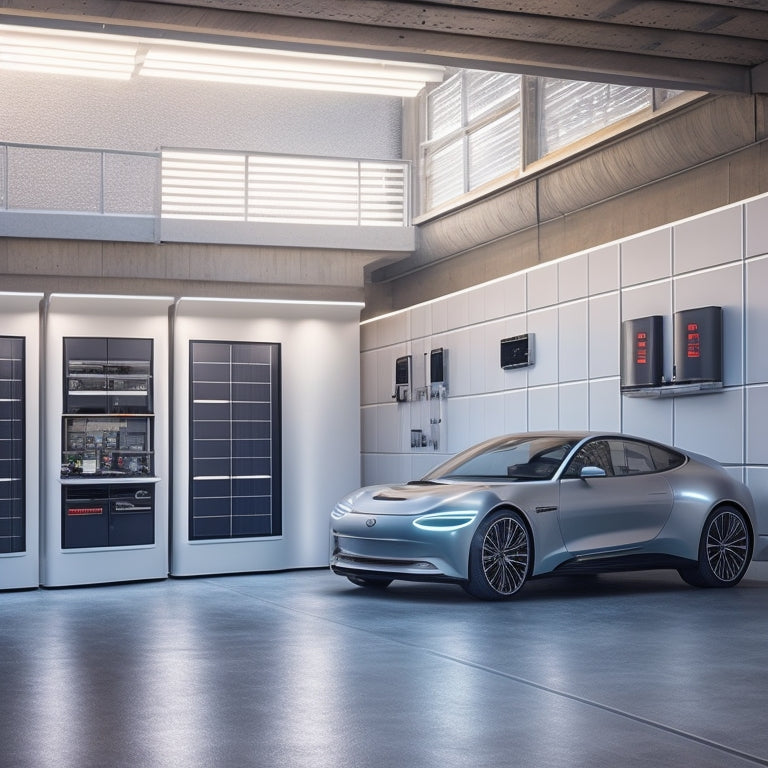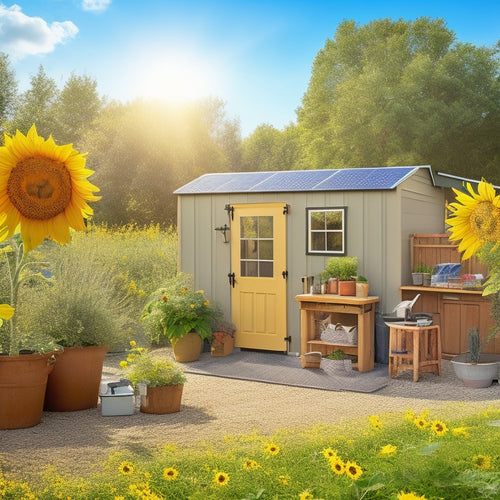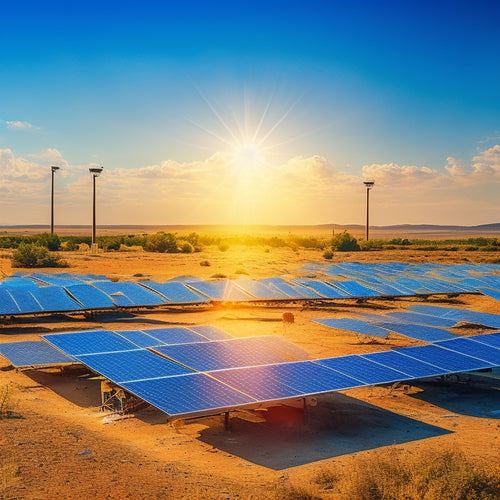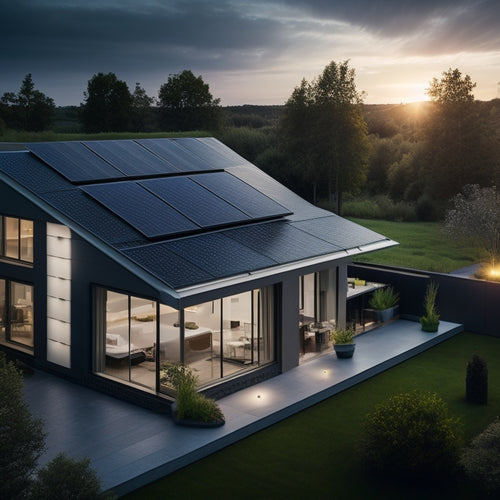
Home Power Storage Systems
Share
You're considering a home power storage system to guarantee a reliable energy supply, protect your appliances, and prepare for unexpected outages. These systems provide backup power during grid failures, allowing essential appliances to run on stored power for hours. They also increase property value, acted as a buffer against fluctuating electricity rates, and contribute to energy independence. Deep cycle battery technology is key, with factors like cycle life and depth of discharge impacting system performance. Evaluating your energy demands is vital to designing a cost-effective system. By understanding the complexities of home power storage, you'll be equipped to make informed decisions about your energy future.
The Essentials
- Home power storage systems provide backup power and protection during grid failures, ensuring energy supply to essential appliances.
- Installing a home power storage system increases property resale value and attractiveness to buyers, commanding higher prices in competitive markets.
- Deep cycle battery technology is essential for renewable energy storage systems, with key factors including battery cycle life and depth of discharge.
- Understanding energy usage patterns and daily requirements helps determine home power storage capacity and optimize energy management.
- Longer cycle life and low maintenance needs lead to efficient operation, reduced downtime, and increased longevity of home power storage systems.
Backup Power During Outages
When the grid goes down, you need a reliable backup plan to keep your lights on and critical appliances running.
With a home power storage system, you can guarantee power outage protection and maintain a steady energy supply, even when the utility grid fails.
A reliable battery backup for home provides an all-encompassing solution to three common problems that often arise during these events, including home energy storage and protection of sensitive electronics.
Power Outage Protection
A reliable home power storage system provides more than just a buffer against fluctuating electricity rates - it's also a safeguard against the inconvenience and uncertainty of power outages. You understand the significance of being prepared for the unexpected, and a home power storage system guarantees your home safety and emergency preparedness.
When the grid goes down, you can rely on your stored power to keep your essential appliances running. This means you'll have:
| Appliance | Power Consumption | Runtime |
| Lights | 100W | 8 hours |
| Refrigerator | 200W | 4 hours |
| Medical Equipment | 500W | 2 hours |
| Communication Devices | 50W | 12 hours |
With a home power storage system, you'll have the freedom to live life uninterrupted, even when the grid is down. You'll stay connected, keep your food fresh, and maintain your independence. By investing in a reliable home power storage system, you're taking an essential step towards securing your home safety and emergency preparedness.
Reliable Energy Supply
Your home power storage system serves as a reliable energy supply, providing backup power during outages to keep your critical appliances running.
With a reliable energy supply, you can enjoy uninterrupted power even when the grid goes down. This means you can keep your lights on, fridge running, and medical equipment operational, even during extended power outages.
By having a reliable energy supply, you're taking a significant step towards energy independence, free from the whims of the grid.
By integrating a battery storage system into your solar setup, you can store excess energy generated by your panels during the day to use at night or during power outages, and gain protection from grid outages and fluctuations.
A reliable energy supply also contributes to grid stability. When the grid is stressed, your home power storage system can provide power back to the grid, helping to stabilize it. This not only benefits you but also your community.
With a reliable energy supply, you're not only protecting your own home but also contributing to a more resilient energy infrastructure.
Increased Property Value
You'll likely find that installing a home power storage system increases your property's value in two significant ways.
Many homeowners are now opting for backup power systems to guarantee uninterrupted energy supply during outages, and this trend is expected to continue.
First, it elevates your resale value, making your home more attractive to potential buyers who prioritize energy independence and reliability.
Additionally, a sleek, modern storage system can enhance your home's curb appeal, setting it apart from neighboring properties.
Boosted Resale Value
Installing a home power storage system can greatly enhance your property's resale value, making it a highly attractive feature to potential buyers.
You'll reap significant financial benefits as your property stands out in a competitive market. According to market trends, homes with energy storage systems are in high demand, and buyers are willing to pay a premium for them.
A study by the National Renewable Energy Laboratory found that homes with solar panels and energy storage systems sold for up to $15,000 more than similar homes without them.
This increased resale value can be a significant advantage when selling your property, allowing you to recoup a substantial portion of your investment.
Additionally, having a home power storage system can also give you an edge in a competitive market, as it appeals to environmentally conscious and tech-savvy buyers.
Enhanced Curb Appeal
A home power storage system not only enhances resale value but also raises a property's curb appeal, making it more attractive to potential buyers and passersby alike.
When you install a home power storage system, you're not just investing in a reliable source of energy, you're also upgrading your property's visual appeal. The sleek, modern design of these systems seamlessly integrates with your home's aesthetic, adding a touch of sophistication to your exterior.
You can further enhance the visual appeal by incorporating the system into your landscaping. For instance, you can conceal the system behind a decorative wall or integrate it into your outdoor living space. This landscaping integration not only hides the system from view but also adds to your property's overall aesthetic design.
As a result, you'll enjoy a visually appealing exterior that showcases your commitment to sustainability and modern living. With a home power storage system, you're not just generating clean energy, you're also elevating your property's curb appeal, making it a standout in your neighborhood.
Deep Cycle Battery Technology
When selecting a deep cycle battery for your home power storage system, you'll want to take into account two key factors: battery cycle life and depth of discharge.
Renewable energy storage systems, like those used in off-grid solar power systems, rely heavily on deep cycle batteries to provide consistent power supply in remote areas.
Reliable energy storage is essential for alternative energy systems.
Battery cycle life refers to the number of charge and discharge cycles a battery can handle before its capacity degrades, while depth of discharge measures how much of a battery's capacity is used during each cycle.
Battery Cycle Life
By the time you've settled on a home power storage system, you've likely reflected on the type of battery that will power it. One significant aspect to contemplate is the battery cycle life, which directly impacts battery longevity.
A deep cycle battery's cycle life refers to the number of charge and discharge cycles it can handle before its capacity drops to 80% of its original value. A higher cycle life means more energy efficiency and a longer lifespan for your battery.
Typically, a deep cycle battery can last between 300 to 1,200 cycles, depending on the manufacturer and quality. To maximize your battery's cycle life, it's vital to follow the manufacturer's guidelines for charging and maintenance.
When choosing a battery, look for one with a high cycle life rating. This guarantees your home power storage system operates efficiently and effectively, providing you with the freedom to power your home independently.
A longer cycle life also means fewer replacements, reducing waste and saving you money in the long run.
Depth of Discharge
In conjunction with a battery's cycle life, its depth of discharge (DOD) plays an essential role in determining the overall performance and lifespan of your home power storage system.
As you investigate deep cycle battery technology, understanding DOD is vital. It refers to the percentage of a battery's capacity that's used during each discharge cycle. A higher DOD means more energy is extracted from the battery, but it also reduces the battery's lifespan.
When selecting a battery for your home power storage system, consider the discharge efficiency and depth measurement. A higher discharge efficiency means the battery loses less energy during discharge, resulting in more usable power.
Depth measurement, on the other hand, indicates how deeply the battery is discharged. A battery with a higher depth measurement can provide more power during each cycle.
To maximize your battery's performance, aim for a DOD between 20% and 50%. This balance allows for efficient energy extraction while preserving the battery's lifespan.
Assess Your Energy Demands
You'll need to understand your energy usage patterns to determine the right home power storage system for your needs.
Start by identifying your daily power requirements, including the total watt-hours you use and the maximum surge capacity you'll need to cover peak usage periods.
Considering your energy storage goals, whether it's to solve power outages or lower your utility bills, will also help you choose the right system.
Energy Usage Patterns
During peak consumption hours, your home's energy usage patterns are likely to reveal a story of how you live and work within those walls. Understanding these patterns is vital for effective energy management and utilizing the full potential of home power storage systems. By analyzing your energy consumption, you can identify usage trends, peak demand periods, and opportunities for efficiency strategies.
| Energy Usage Category | Peak Demand Period |
| Lighting | 6:00 pm - 9:00 pm |
| HVAC | 12:00 pm - 4:00 pm |
| Appliances | 7:00 am - 9:00 am |
| Electronics | 8:00 pm - 11:00 pm |
| Water Heating | 6:00 am - 8:00 am |
Daily Power Requirements
Evaluating your daily power requirements involves calculating the total amount of electricity your home needs to function comfortably. This calculation is essential in determining the capacity of your home power storage system.
You'll need to take into account the wattage and usage hours of each appliance, lighting, and device in your home. Start by making a list of all the devices you want to power, including lights, refrigerators, computers, and televisions.
Next, estimate the number of hours each device will be used daily. You'll also need to take into account your energy efficiency strategies, such as using energy-efficient LED bulbs or appliances with high Energy Star ratings.
By reducing your energy consumption, you can decrease the size and cost of your home power storage system. When integrating solar panels into your system, you'll want to verify your storage capacity can handle the excess energy generated during the day.
Accurately evaluating your daily power requirements will help you design a system that meets your energy needs, providing you with the freedom and independence you desire.
Longer Cycle Life Guaranteed
You'll want to guarantee your home power storage system provides a longer cycle life, which directly impacts its overall performance and lifespan.
A low maintenance guarantee is essential in this regard, as it guarantees your system operates efficiently with minimal upkeep.
Low Maintenance Guarantee
Your home power storage system's reliability hinges on its ability to perform consistently over a prolonged period. This is where a low maintenance guarantee comes into play, ensuring you can enjoy uninterrupted power supply without worrying about frequent system checks or repairs.
With a longer cycle life guaranteed, you can rest assured that your system will operate efficiently for years to come.
A low maintenance guarantee translates to reduced downtime and increased system longevity. This means you'll spend less time and money on maintenance, allowing you to focus on what matters most - enjoying the freedom and independence that comes with having a reliable home power storage system.
By minimizing maintenance needs, you'll also reduce the risk of system failures, which can lead to costly repairs or even complete system replacement.
Our low maintenance guarantee is built on the principles of maintenance efficiency, ensuring your system operates at peak performance while minimizing the need for frequent interventions.
With a longer cycle life guaranteed, you can trust that your system will provide you with the energy independence you desire, without breaking the bank or sacrificing your peace of mind.
Frequently Asked Questions
Can I Use My Existing Electrical Panel With a Home Power Storage System?
You'll need to assess your existing electrical panel's compatibility with the storage system; if it's outdated, you may require panel upgrades to guarantee a safe and efficient connection, so it's vital to consult a licensed electrician for a thorough evaluation.
How Do I Know if My System Is Eligible for Rebates and Incentives?
As you commence on an expedition to utilize freedom from the grid, you'll want to chart a course for cashback; research rebate programs, scrutinize eligibility criteria, and guarantee your system meets the requirements to access the treasure chest of incentives.
Can I Add More Batteries to My System in the Future?
You can upgrade your system's capacity by adding more batteries in the future, as long as you guarantee battery compatibility, plan for future expansion, and follow the manufacturer's guidelines to avoid voiding your warranty.
Do Home Power Storage Systems Require Regular Maintenance?
You'll want to perform routine checks to guarantee your system runs at its best, as neglecting maintenance can reduce battery lifespan and system efficiency, ultimately affecting your energy independence and freedom from grid reliance.
Can I Use My System to Charge My Electric Vehicle?
When charging your electric vehicle, you'll want to maximize charging efficiency, so you'll need to verify your vehicle's battery is compatible with your system's output; check your system's specs to confirm compatibility and optimize your EV's charging experience.
Final Thoughts
As you flip the switch on home power storage systems, you're not just illuminating your home - you're igniting a signal of independence. With backup power during outages, increased property value, and deep cycle battery technology, you're utilizing the power to take control. By evaluating your energy demands, you're charting a course for a brighter future. And with a longer cycle life guaranteed, you can rest assured that your investment will shine on, a steady flame in the face of uncertainty.
Related Posts
-

Building an Emergency Backup Solar Power System in 5 Essential Steps
Building an emergency backup solar power system involves five key steps. First, assess your daily energy needs to ide...
-

What Happens Without a Charge Controller in Solar Panels
Without a charge controller in your solar panel system, you risk overheating batteries due to overcharging, which can...
-

Home Solar Battery
You're opting for a home solar battery that allows you to utilize the power of the sun during the day and use it at n...


